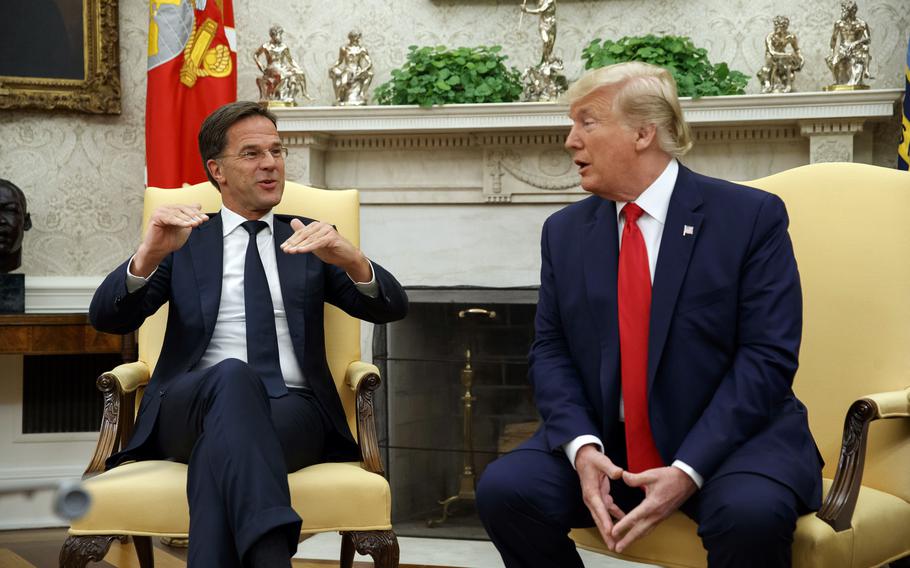
President Donald Trump with former Dutch Prime Minister Mark Rutte in the Oval Office in 2019. Now NATO’s secretary-general, Rutte said Jan. 20, 2025, that the alliance will turbocharge defense spending during Trump’s second term. (Alex Brandon/Associated Press)
STUTTGART, Germany — NATO countries are ready to “turbocharge” defense spending, the alliance’s top official said this week as the security bloc prepares for President Donald Trump’s anticipated push to get European militaries to do more.
Secretary-General Mark Rutte, in a statement Monday shortly after Trump was sworn into office, made the American president’s top NATO issue his own.
“With President Trump back in office, we will turbocharge defense spending and production,” Rutte said, adding that Trump’s often-stated mantra of peace through strength can be achieved through NATO.
The return of Trump will once again put European defense spending levels at the center of the United States’ approach to NATO. Over the past several years, NATO members have boosted investments, with about 20 out of 32 members hitting the alliance’s benchmark of spending 2% of gross domestic product on defense.
The gains, some of which came during Trump’s first term, picked up momentum after Russia’s 2022 full-scale invasion of Ukraine.
However, numerous countries still don’t have a plan for immediately hitting the 2% target, let alone getting to Trump’s more recent demand that the minimum spending level be elevated to 5% of GDP.
It’s unclear what the consequences could be should allies resist Trump, who in the past has indicated an openness to quitting the alliance if they don’t shoulder more of the security burden.
Lithuania, a Baltic state especially worried about Russian aggression, already has decided to ratchet up its spending level to between 5% and 6% of GDP.
Lithuanian President Gitanas Nauseda on Friday announced the decision, which puts the country in line with Trump’s preference. The Baltic countries and Poland, are among the top NATO defense spenders on a per-capita basis.
Warsaw said last year that it aims to get to the 5% level in 2025. Poland has been on a weapons buying binge and over the weekend received its first batch of M1A2 Abrams battle tanks purchased from the U.S.
However, not all allies are on board. German Chancellor Olaf Scholz said last week that going to 5% would only be possible with “massive tax increases or massive cuts to many things that are important to us.”
Still, other leaders in Germany, where federal elections are slated to take place next month, say Berlin needs to invest beyond the 2% of GDP level. Last year, Germany met the 2% threshold for the first time.
How Germany manages the defense spending debate with Trump could factor into White House calculations about the future of the American military presence in Europe.
At the end of Trump’s first term, he sought to remove about 12,000 troops from Germany in connection with his complaints about the chronic low levels of domestic spending on defense by successive German governments.
French President Emmanuel Macron, speaking one hour before Trump’s inauguration Monday, said European countries should prepare in the event the White House reduces its commitments in Europe.
“What will we do in Europe tomorrow if our American ally withdraws its warships from the Mediterranean?” Politico quoted Macron as saying. “What if (the U.S.) switches its fighter planes from the Atlantic to the Pacific? These are all scenarios we need to prepare for.”